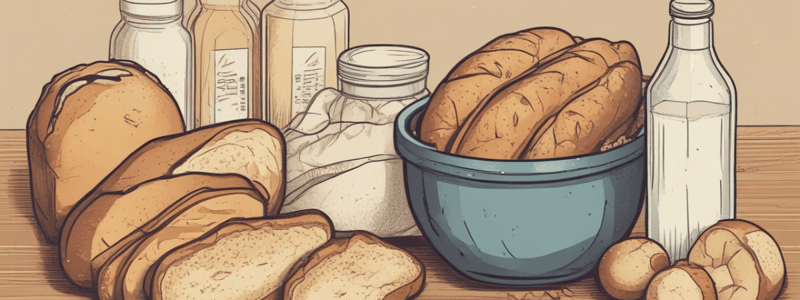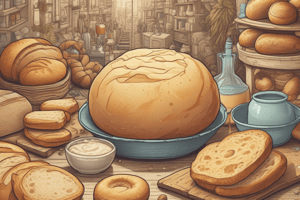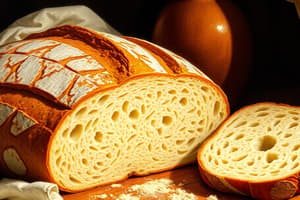Podcast
Questions and Answers
What is necessary for yeast and bacteria to thrive in dough making?
What is necessary for yeast and bacteria to thrive in dough making?
- Sufficient water (correct)
- Sufficient heat
- Sufficient sugar
- Sufficient oxygen
What is the role of amylase in dough making?
What is the role of amylase in dough making?
- To absorb excess water
- To break down proteins
- To degrade starch into sugars (correct)
- To strengthen gluten bonds
What happens to gluten bonds in excess water?
What happens to gluten bonds in excess water?
- They become weaker (correct)
- They dissolve
- They become stronger
- They remain unchanged
What type of dough is created with excess water?
What type of dough is created with excess water?
Why do some artisan bakers use spring water?
Why do some artisan bakers use spring water?
What is the effect of hard tap water or well water on dough?
What is the effect of hard tap water or well water on dough?
What is the effect of soft water on dough?
What is the effect of soft water on dough?
What is the primary concern for professionals using tap water in dough making?
What is the primary concern for professionals using tap water in dough making?
Flashcards are hidden until you start studying
Study Notes
Water in Dough Making
- Water is a critical ingredient in dough making, and yeast and bacteria cannot thrive without sufficient water.
- Adding or subtracting water from a dough or pre-ferment can have profound effects on the rate and type of fermentation.
- Amylase, an enzyme critical to fermentation, cannot degrade starch into sugars without sufficient water.
Effects of Water on Dough Structure
- Water content affects the structure of bread dough, with gluten formation dependent on the presence of water.
- Excess water creates an ideal environment for enzyme activity, weakening gluten bonds and making dough stickier.
- Dry dough tends to be stronger, with a close, cottony crumb, while extra water ensures a more extensible dough with large, irregular holes and a chewy texture.
Source of Water
- Some artisan bakers use spring water to avoid chlorine or other additives in tap water.
- However, using tap water is a common practice among professional artisan bakers, as the levels of chlorine or other chemicals are unlikely to negatively affect fermentation.
- The mineral content of hard tap water or well water can give dough greater strength and benefit fermentation, while soft water tends to lengthen fermentation times and may give dough an unusual level of extensibility.
Addressing Water Issues
- Installing filtration systems can help address issues with water quality or additives.
- Adjusting fermentation times or adding sets of folds during bulk fermentation can compensate for a lack of strength in dough due to too-soft water.
Studying That Suits You
Use AI to generate personalized quizzes and flashcards to suit your learning preferences.




